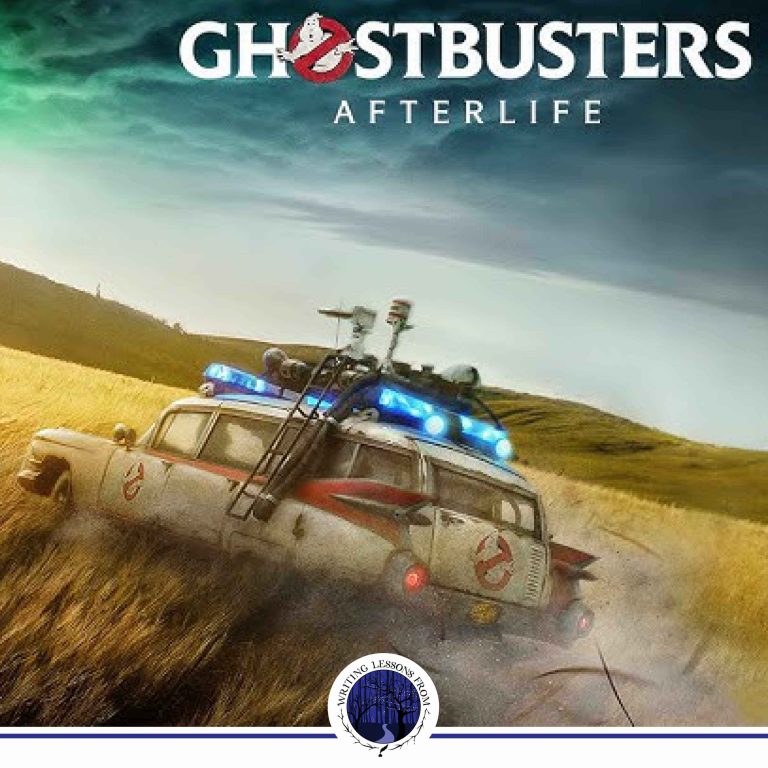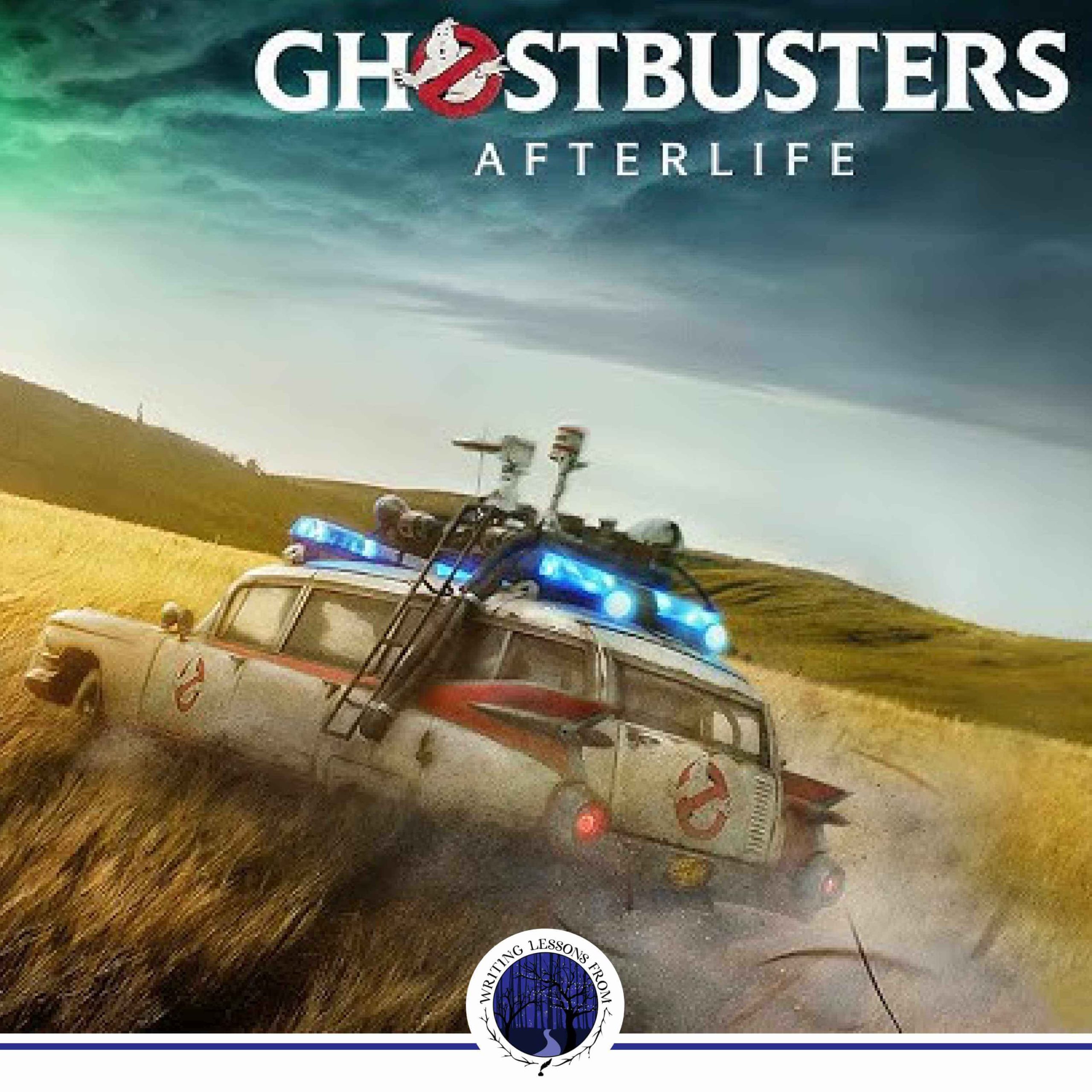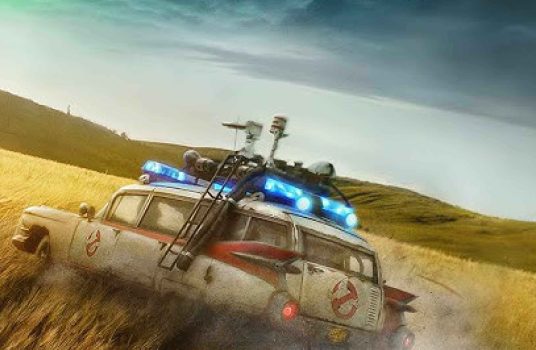Writing Lessons From... Ghostbusters: Afterlife
Listen to the blogcast of this episode:
I wasn’t going to write this one. It feels blasphemous to even consider it.
However, in the wake all of the promotion for the new Ghostbusters: Frozen Empire film, I was reminded of Ghostbusters: Afterlife and the conundrum I felt while watching it.
Ghostbusters was a huge part of my childhood. Both original films developed my sense of humour, a huge crush on Dan Aykroyd and probably the beginning of a fascination with the paranormal.
I enjoyed the female-led Ghostbusters (in 2016), and struggle to see why others didn’t. Given the backlash from men, I’m particularly defensive of it. Especially when those same men defend Afterlife.
Don’t get me wrong, I don’t think Afterlife was bad. I just think it could have been so much better.
And given how wrong it feels to say such things, I’ve spent a lot of time thinking about why I feel this way.
If you haven’t watched Ghostbusters: Afterlife yet, from here, there be spoilers
(Ghostbusters: Afterlife keeps moving around. It’s worth checking all the platforms regularly to see if it pops up!)

Ghostbusters! Whaddya want?
I’ll tell you what I wanted.
A film that continues the story, with the characters we know and love, some nice little Easter eggs, and an original story.
The characters bit is tricky, given the ages of everyone concerned now. So the introduction of new characters is understandable. And hey, why not make them kids. It gives the franchise longevity, a good business decision.
Afterlife mainly follows the grandchildren of Ghostbuster Egon Spengler, who has passed away and left his old, rickety house in the middle of nowhere to his estranged daughter.
It’s nice to be following Egon, I always felt he was hidden in the shadows of Ray (Aykroyd) and Venkman (Bill Murray). This storytelling decision was most likely governed by the passing of Harold Ramis, who played Egon.
Anyway, it turns out old ‘crackpot’ Spengler was on to something. Something dangerous. Something godly.
Something…repetitive.
Yes, Gozer is coming back, along with Gatekeeper Zuul (there is no Dana, only Zuul) and the Keymaster, and Egon dies trying and failing to stop this from happening. That job now rests on the young shoulders of his granddaughter, with the help of her new friend, family and school teacher Paul Rudd (naturally).
It’s a great concept. Not quite original, but it has a lot of potential.
Sorry if I sound cynical
I was pretty much on board with most of the film until the third act.
Have you seen Scream? The new one. Where they go a bit meta and describe a requel – a mixture of a sequel and remake, the kind of film that is all the rage these days as the big names in film don’t feel able to take chances on anything original and, anyway, the world is burning and we all want to revert to our childhoods.
Afterlife is a requel.
And a requel should have an abundance of Easter eggs, those little gems hidden for real fans to spot and feel that wonderful warmth at being in on the joke.
Arguably, Afterlife is jam-packed with Easter eggs, until those Easter eggs stop being hidden gems and start being almost shot-for-shot scenes from the first film.
This is the exact moment I lost interest.
What did the script say, exactly? ‘Blah, blah, blah, copy this from the original’?
My guess is they wanted us fans to sit back, happy in the knowledge that we knew exactly how Gozer was going to be brought forth, shot by shot, line by line. Instead, I sat back and started to think about other things, because I knew how this was going to play out. I’d seen it before.
There’s no excuse for lazy writing.
I understand that this was probably a creative decision, but it was a lazy one. The writers couldn’t have taken an hour or two to brainstorm something different? Anything different! Something original!
We’re a generation who grew up on these wonderful, original comedies and concepts. We should be able to come up with our own stuff.
You know what, I’m not cynical about this. I’m angry.
That ending…
The end of the film sees Ray, Venkman and Winston arrive in the nick of time to help Spengler’s family defeat Gozer.
You probably knew it was coming. I certainly did. Still, that didn’t stop me from bursting into tears the moment Egon’s ghost turned up to help his granddaughter.
On one hand, this was expected, right from the beginning. It had to happen. And it’s a heart-warming, wonderful moment when it does.
But if there’s one thing I hate in storytelling, it’s being manipulated to tears. I’m a peri-menopausal woman who will sob at a charity advert, so it’s not difficult for a film to make me well up. Afterlife made me full-on sob my heart out.
And I resent it.
Why? Because I couldn’t figure out, even days after watching Afterlife, if I was crying because of great storytelling or because they put an aged CGI Harold Ramis in front of me and stood him next to Ray, Venkman and Winston.
It’s sentimental, the story was sweet, but was it good enough to sob at? I’m not convinced.
The writing lessons…
I don’t think the ending here is the problem. I’m glad Egon showed himself. It was a truly beautiful moment that deserved a tear or two (and no more. Stupid hormones).
The problem, as I see it, was what came directly before.
Even if you’re paying homage to a story, do not recreate it scene for scene. If I wanted to watch Gozer come back, I would just put on the first film, which was overall cleverer and funnier than Afterlife.
I did appreciate the Easter eggs. I loved the story of Egon escaping to investigate more supernatural threats, and of his granddaughter taking after him so much. But wouldn’t it have been wonderful if the threat they faced had been something new and exciting?
The big lesson in this one is originality. It’s not a lesson learned quietly here. This film made me angry.
Admittedly, some of that anger came from outside the storytelling. Jason Reitman, the director, openly dismissed and disparaged the female-led Ghostbusters film, presumably because he wasn’t involved, as if this legacy belonged to him and his father (who directed the first two films).
The female-led film had an original plot while being a wonderful homage to the first two ‘80s films (and had the backing of the Ghostbusters creators and cast), while Afterlife was a…rehash.
The joy of jumping onto a franchise like this is to take the love and make it your own. That didn’t happen enough here. As writers, there is no excuse for a lack of creativity, playfulness or imagination.
Without those things, it becomes just a commercial venture to take the hard-earned money of the sentimental generation who grew up with the beginnings of something genius.


